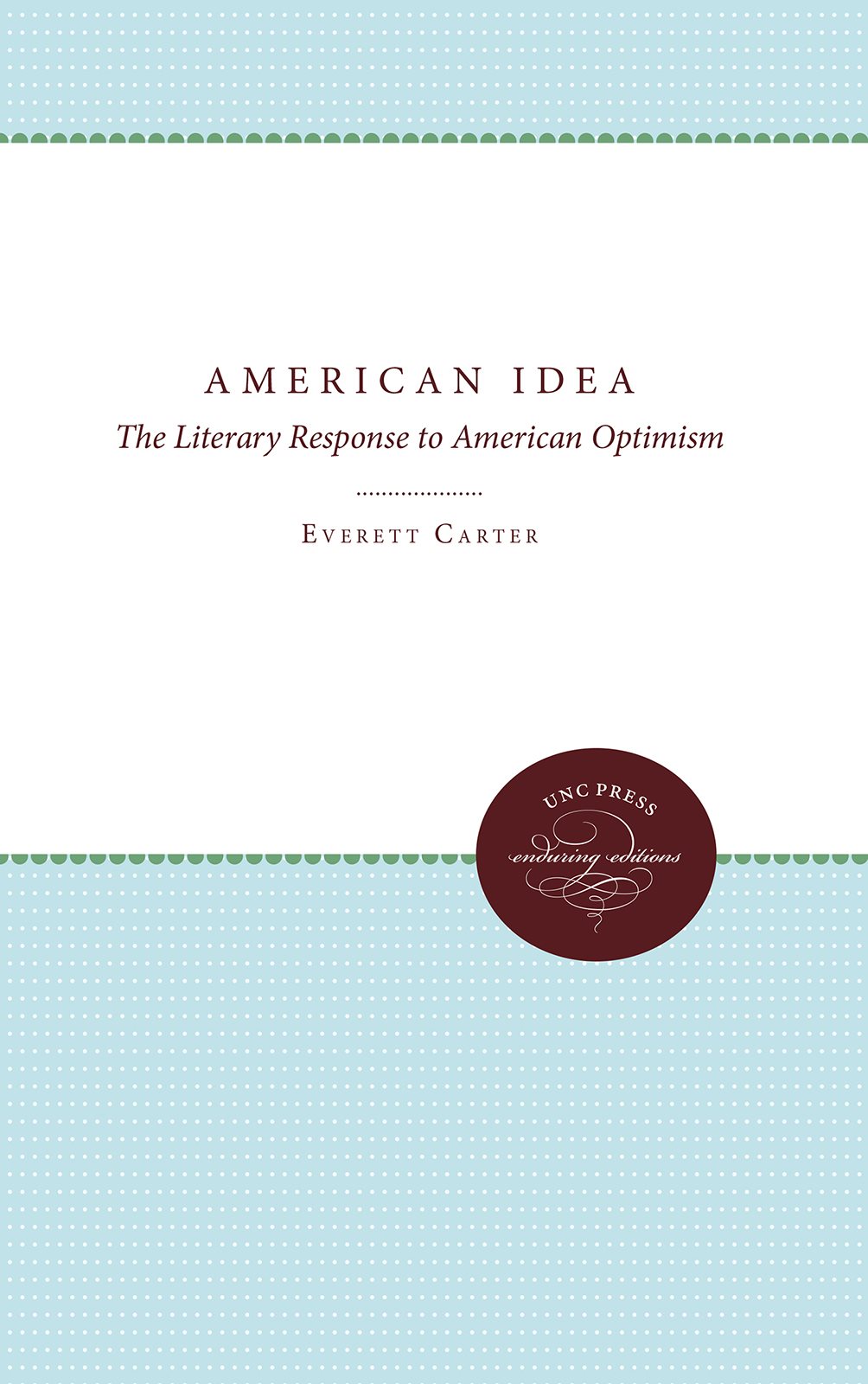Contents

The American Idea
The American Idea
The Literary Response to American Optimism
by Everett Carter
The University of North Carolina Press
Chapel Hill
Copyright 1977 by
The University of North Carolina Press
All rights reserved
Manufactured in the United States of America
ISBN 0-8078-1279-X
Library of Congress Catalog Card Number 76-13867
Library of Congress Cataloging in Publication Data
Carter, Everett.
The American idea.
Bibliography: p.
Includes index.
1. American literatureHistory and criticism.
2. United StatesCivilization. I. Title.
PS88.C39 810.9 76-13867
ISBN 0-8078-1279-X
Contents
Preface
The literary historian who interprets American writers from the standpoint of their interaction with their culture must have certain faiths. He must believe that there is an American culture; he must believe that it has been a valuable addition to humanity; he must believe that significant and pleasing literature has been shaped byand in turn has shapedthis culture. I believe these things.
Yet after affirming these faiths, I avow the doubts that should occur to anyone who says that this is American culture, this is how our poetry and prose took their shapes, these are the writers in whom we best see the interplay of social and individual artistry. So various have been the ways of Americans that it seems safer, if not truer, to deny the existence of an American civilization and to tell instead the variety of its paradoxes; so pervasive has been the modernist conviction of its failure that it seems strange to respect its achievements; so blessedly, humanly contradictory are the best writings of its best writers that to evaluate them as parts of a pattern seems reductive. The following pages, I hope, are respectful of these doubts at the same time that they argue that many of our writers were products of a controlling social consciousness, a common idea, which constituted the reality of American sensibility, especially in the nineteenth century, and that the forms of these writers were metaphors of their affirmation or rejection of that idea. Many, not all. Not Emily Dickinson, not Stephen Crane, not a few other important poets and novelists whose work, even more than
that of other major writers, resists my possibly procrustean synthesis.
The perspective of this study compels a further deference. My conception partakes of one version of post-Cartesian uncertainty about the separation of subject and objecta version best represented by William James and Robert Frost, who both saw reality as a relation between perceiver and thing perceived without losing their respect for the world out there. This perspective suggests that the perceptual world of many modern observers is so different from that of the nineteenth century that they are unable to see the artifacts of this great age. I am conscious of both the irony and presumption of my conviction that the objects I have seenthe prose and poetry of the American pastare probably the true objects. Nevertheless, I hope to show that my perceptions, sympathetic to the optimism that was the controlling tone of the nineteenth century, can illuminate the significance and appreciate the value, not only of the currently fashionable writers of rejectionMelville, Hawthorne, Jamesbut of the major affirmative writersEmerson, Thoreau, Whitman, and, yes, Mark Twainand of the minor worthy voices of Lowell, Holmes, and Longfellow. The latter are voices we are in danger of losing in the current revulsion against forms of affirmation, and this danger explains why some of these writers receive more attention from me than their rank would seem to warrant.
In making this synthesis between the idea of America and literary forms, I started at the beginning with an examination of the writers of the seventeenth and eighteenth centuries to show how early literary forms expressed the variety of responses to the growing public faith in goodness and progress. My major concern, however, was with the century when our greatest literature was written and when, with few exceptions, the styles of our writers might be seen as functions of their involvement with the official style of the nineteenth century. My study ends with the beginning of the twentieth century, save for some afterwords about one of our most respected contemporary novelists that suggest that, despite the exhaustion of nineteenth century faiths, the ghosts of the optimism that constituted the cultural meaning of America continue to haunt the American literary imagination and to shape American literary forms.
My views are the result of the research and criticism of more writers than I can possibly name. The formulations of Oscar Cargill, Merle Curti, Ralph Gabriel, Henry Bamford Parkes, Max Lerner, and Daniel Boorstin about American intellectual history and the specific studies of the idea of progress in America by A. A. Ekirch and W. Warren Wagar are among the works that provided the backgrounds for my interpretation. Previous observers who have been concerned with the literary aspects of this history are more numerous; some, but necessarily only a small proportion, have been acknowledged in my text. My colleagues in the American literature group at Davis, especially James Woodress and Brom Weber, have cheered me by their continuing interest in literary history. I have come to realize that my early teachersDixon Wecter, Louis Wright, and Leon Howardalways brought idea and form together in their masterful writings about our literary past. It is from an essay on Oliver Wendell Holmes written for the celebration of Leon Howards contributions to our profession (Themes and Directions in American Literature: Essays in Honor of Leon Howard, edited by Ray B. Browne and Donald Pizer [West Lafayette: Purdue Research Foundation, 1969]; reprinted by permission of the publisher) that the present work in large measure stems. I have also used parts of my essay written as the introduction to Harold Frederics The Damnation of Theron Ware, (Cambridge: Harvard University Press, 1960, 1960 by the President and Fellows of Harvard College; reprinted by permission of the publisher), in my present treatment of that writer. I am grateful to the John Simon Guggenheim Memorial Foundation and to the Research Committees of the University of California, Davis, for their generous aid. And I wish to thank my wife, Cecile Doudna Carter, who is reason enough for sympathy with American optimism.
The American Idea
I The American Idea
This is a view of American literature from a perspective familiar to aging readers of Vernon Louis Parringtons Main Currents of American Thought. Forty years ago Parrington identifed an optimistic belief in human possibility as the flow of social faith that sustained American writers from Roger Williams through Emerson and Howells and against which Poe and Melville and James swam with varying degrees of desperation. Parringtons insight has been submerged under the negations of a modernism that has become the orthodox academic position toward the arts. Turning away from society, first under the impact of new critical formalism and then under the influence of a variety of metaphysical pessimisms, the new orthodoxy has had little but scorn for a view of literature that sees art as a function of society and little but contempt for visions of life in America as anything but a disaster.



